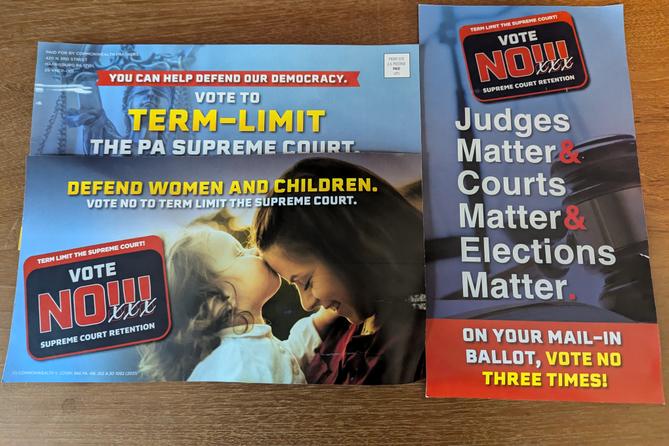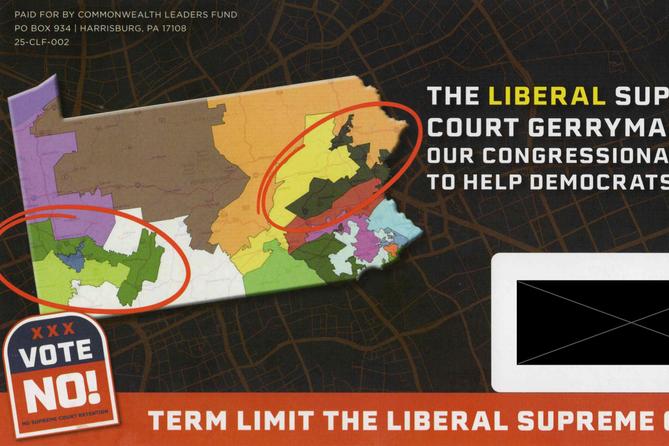HARRISBURG — A conservative political action committee is behind a mailer, described by one good-government advocate as “incredibly dishonest,” that urges voters to reject new terms for three state Supreme Court justices.
The PAC is closely connected to two other groups that have been highly visible in the fight to influence the Nov. 4 retention elections. All three are affiliated with GOP heavyweight Matt Brouillette, whose PACs are mostly funded by Jeff Yass, Pennsylvania’s richest man.
The retention elections — in which voters will decide whether Justices Christine Donohue, Kevin Dougherty, and David Wecht get more time on the bench — are seen as critical in Republican circles.
The court flipped to Democratic control after the 2015 election, and has made dozens of high-profile decisions over the past decade that have shaped politics and policy. This year marks Republicans’ first real chance to launch a takeover. Their goal is to create vacancies so that they can run competitive, partisan elections in 2027.
That misleading mailer, which began arriving at voters’ homes this month, says that the “liberal Supreme Court gerrymandered our congressional districts to help Democrats win.”
It includes an image of a congressional map, with two of its more convoluted-looking districts circled in red. One, hammer-shaped, stretches more than 100 miles from Pennsylvania’s western border into Cambria and Somerset Counties. The other, even more jagged, sprawls from Lackawanna County down to Pine Grove, in southern Schuylkill County.
But that’s not a map the current court drew.
In fact, a GOP-controlled state legislature drew it in 2011. The current court overturned it in 2018, declaring it a partisan gerrymander that favored Republicans.
That 2011 map was the impetus for Carol Kuniholm, who advocates for nonpartisan reapportionment with the group Fair Districts PA, to get involved in the politics of redistricting. Despite Democrats having a voter registration edge in the commonwealth, under that map, Republicans had won 13 of Pennsylvania’s 18 congressional seats three elections in a row. So the court’s decision to overturn it, Kuniholm said, was a watershed.
She’s been involved in redistricting advocacy ever since, and has seen a lot of contentious judicial races. But of the mailer she called “dishonest,” she noted, “I don't think anybody has seen anything like this.”
Voters have noticed the mailer too.
Bill Litvin, of Berks County, received it. Litvin is a registered Republican, and he’s deeply familiar with congressional maps because he’s also a member of the League of Women Voters, which advocates for fair redistricting and other election-related issues.
Litvin immediately knew the map in the ad wasn’t the current congressional map. But other voters, he noted, might not.
“It would just be nice if all the participants in the election would be honest. It turns a lot of people off from voting when they aren’t,” he told Spotlight PA.
Who is funding the mailers?
The mailers in question are being funded by Commonwealth Leaders Fund. It is one of two PACs administered by the conservative nonprofit Commonwealth Partners, which Brouillette runs. Thanks to Yass’ money, the group is a central player in funding and promoting virtually all high-profile Republican candidates in Pennsylvania races, from the state House to the governorship.
Commonwealth Leaders’ relationship to Yass is well-established.
Last year, in the lead-up to the presidential election, Commonwealth Leaders received more than $18.5 million from another PAC run by Commonwealth Partners called Commonwealth Children’s Choice Fund. That PAC had received the vast majority of its funding directly from another PAC, Students First, which is exclusively funded by Yass.
Commonwealth Partners has also paid directly for mailers that urge voters to term-limit the court’s justices, as well as ones that invoke high-profile sexual abuse cases on which the court ruled.

Then there’s a new nonprofit, Citizens for Term Limits, which was established in May and registered with the state at the same Harrisburg address as Commonwealth Partners’ office. It has a website, and in just the past week, has made at least $17,900 in ad buys on Meta social media platforms. Spotlight PA has also viewed text message advertising funded by the nonprofit.
Uncovering how much each group is spending on these elections is difficult. Commonwealth Leaders Fund must file regular campaign finance reports with the state. In its most recent report, which covers June 10 to Sept. 15, it reported spending more than $37,600 on “direct mail.”
It’s even harder to track spending from the two nonprofits, which are generally not required to disclose their donors and do not file campaign finance reports.
Individuals and companies that spend on political races in Pennsylvania without coordinating with a particular campaign often report their spending as “independent expenditures,” which at least tells voters how much they paid to influence the race. However, neither Commonwealth Partners nor Citizens for Term Limits has so far reported any independent expenditures.
A spokesperson for Commonwealth Partners told Spotlight PA that “All appropriate expenditures are reported accurately and on time.” They did not comment on the redistricting ad.
The real history of the map in that mailer
The Pennsylvania Supreme Court, which currently has a 5-2 majority of judges elected as Democrats, has been heavily involved in redistricting in recent years.
In 2011, the then-Republican-controlled General Assembly and Republican governor passed a congressional map under which GOP candidates won all but five of Pennsylvania’s 18 seats for three elections in a row.
That changed in 2018. A group of Democratic voters had sued the state, arguing that the 2011 map was gerrymandered to favor Republicans and effectively disenfranchised them. The state Supreme Court ruled in their favor, writing that the map “clearly, plainly and palpably” violated the state constitution and the legislature should redraw it in time for that year’s primary election.
The high court’s decision was mostly partisan — one Democratic justice disagreed with the speed of the timeline for implementing a new map — though a Republican Commonwealth Court judge did note in a finding of fact on the case “that partisan considerations are evident in the enacted 2011 Plan, such that the 2011 Plan overall favors Republican Party candidates in certain congressional districts.”
That judge was Kevin Brobson, who now sits on the state Supreme Court.
After state lawmakers were unable to agree on a redrawn congressional map, the state Supreme Court justices commissioned one themselves. That map yielded a 9-9 partisan split in the next congressional election.
A similar process played out in 2021, the next time the map underwent its usual redraw. The legislature and governor again deadlocked, and the court again commissioned and selected a map — opting for one that skewed close to their 2018 pick.
These days, Republicans again have an upper hand within Pennsylvania’s congressional delegation, with 10 members to Democrats’ seven. (The state lost a congressional seat in the last redistricting cycle.)
Kuniholm noted that the state constitution promises Pennsylvanians free and equal elections, and she considers it “incredibly important for Pennsylvania that we have a court that takes our rights seriously” when it comes to redistricting.
“Clearly,” she added, “the ones who had drawn the gerrymandered map are not happy.”
